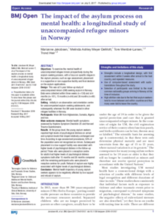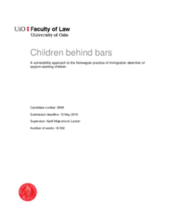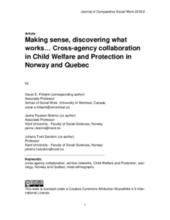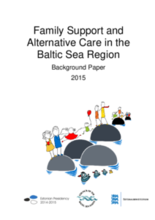Displaying 71 - 80 of 86
This article compares blank care order application templates used in four countries (England, Finland, Norway, and USA (California)), treating them as a vital part of the ‘institutional scripts’ that shape practice, and embody state principles of child protection.
This is the first controlled study of an expressive arts group intervention with unaccompanied minor asylum seeking children. The aim of the study was to examine whether such an intervention may alleviate symptoms of trauma and enhance life satisfaction and hope.
This article explores young people's experiences in the transition to adulthood from child welfare services and how Honneth's theory of recognition can be useful as an analytical tool to help us understand these experiences.
Informed by a cultural psychological approach to development, the authors analysed interviews with 18 unaccompanied Afghan boys and their professional caregivers.
This study examined the mental health of unaccompanied refugee minors during the asylum-seeking process, with a focus on specific stages in the asylum process, such as age assessment, placement in a supportive or non-supportive facility and final decision on the asylum applications.
This paper discusses how Norway is in a position where it needs to balance its interests in immigration control with its obligations under international human rights law to protect the rights and liberties of asylum-seeking children. This document emphasizes the importance of protecting vulnerable children. In general this paper analyzes the ways that Norway acknowledges and protects the vulnerability of asylum seeking children. It also discusses the jurisprudence in place in relationship to vulnerable asylum-seeking children.
This study seeks to understand collaboration dynamics in social services for determining what strategies work best in facilitating collaborative endeavors in specific policy and institutional environments.
To facilitate well-informed decisions, the researchers collected and disseminated evidence from systematic reviews (SR) to local child welfare stakeholders in Norway through plain language summaries. This article describes that process.
This background paper was developed as part of a regional study which gathered relevant data and information on family support and alternative care in the eleven Member States of the Council of the Baltic Sea States (CBSS).
The aim of this study was to assess the prevalence and comorbidity of mental disorders applying diagnostic interviews in an entire population of adolescents living in residential youth care (RYC) in Norway.




